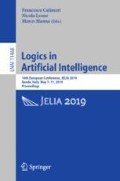Abstract
Abstract dialectical frameworks (ADFs) are generalizations of Dung’s argumentation frameworks which allow arbitrary relationships among arguments to be expressed. In particular, arguments can not only attack each other, they also may provide support for other arguments and interact in various complex ways. The ADF approach has recently been extended in two different ways. On the one hand, GRAPPA is a framework that applies the key notions underlying ADFs – in particular their operator-based semantics – directly to arbitrary labelled graphs. This allows users to represent argumentation scenarios in their favourite graphical representations without giving up the firm ground of well-defined semantics. On the other hand, ADFs have been further generalized to the multi-valued case to enable fine-grained acceptance values. In this paper we unify these approaches and develop a multi-valued version of GRAPPA combining the advantages of both extensions.
This research has been supported by DFG (Research Unit 1513 and project BR 1817/7-2) and FWF (project I2854).
Access this chapter
Tax calculation will be finalised at checkout
Purchases are for personal use only
Notes
- 1.
- 2.
We call a parent \(n'\) of a node n l-parent if the link \((n',n)\) is labelled with l.
- 3.
We will often leave \(\varSigma \) implicit in definitions from now on.
- 4.
The values \(val^m(max_{W,\preccurlyeq }(l))\) and \(val^m(min_{W,\preccurlyeq }(l))\) are only defined when \(\hat{\preccurlyeq }\) is an order that has a maximal, respectively, minimal, element for every subset of V. The expressions \(max_{W,\preccurlyeq }(l)\) and \(min_{W,\preccurlyeq }(l)\) may only be used when this is the case.
- 5.
The use of \(min_{W}\) and \(max_{W}\) is restricted to settings where the label domain L is numeric.
References
Al-Abdulkarim, L., Atkinson, K., Bench-Capon, T.J.M.: Abstract dialectical frameworks for legal reasoning. In: Hoekstra, R. (ed.) Proceedings of the 27th Annual Conference on Legal Knowledge and Information Systems (JURIX 2014), Jagiellonian University, Krakow, Poland, 10–12 December 2014. FAIA, vol. 271, pp. 61–70. IOS Press (2014)
Al-Abdulkarim, L., Atkinson, K., Bench-Capon, T.J.M.: A methodology for designing systems to reason with legal cases using abstract dialectical frameworks. Artif. Intell. Law 24(1), 1–49 (2016). https://doi.org/10.1007/s10506-016-9178-1
Al-Abdulkarim, L., Atkinson, K., Bench-Capon, T.J.M., Whittle, S., Williams, R., Wolfenden, C.: Noise induced hearing loss: an application of the angelic methodology. In: Proceedings of the 30th Annual Conference on Legal Knowledge and Information Systems (JURIX 2017), Luxembourg, 13–15 December 2017, pp. 79–88 (2017). https://doi.org/10.3233/978-1-61499-838-9-79
Atkinson, K., Bench-Capon, T.J.M.: Relating the ANGELIC methodology and ASPIC+. In: Modgil, S., Budzynska, K., Lawrence, J. (eds.) Proceedings of the 7th International Conference on Computational Models of Argument (COMMA 2018), Warsaw, Poland, 12–14 September 2018, pp. 109–116 (2018). https://doi.org/10.3233/978-1-61499-906-5-109
Baroni, P., Caminada, M., Giacomin, M.: An introduction to argumentation semantics. Knowl. Eng. Rev. 26(4), 365–410 (2011)
Bogaerts, B.: Weighted abstract dialectical frameworks through the lens of approximation fixpoint theory. In: Hentenryck, P.V., Zhou, Z.H. (eds.) Proceedings of the 33rd AAAI Conference on Artificial Intelligence (AAAI 2019), Honolulu, Hawaii, USA, 27 January–1 February 2019 (2019)
Brewka, G., Ellmauthaler, S., Strass, H., Wallner, J.P., Woltran, S.: Abstract dialectical frameworks revisited. In: Rossi, F. (ed.) Proceedings of the 23rd International Joint Conference on Artificial Intelligence (IJCAI 2013), Beijing, China, 3–9 August 2013, pp. 803–809. AAAI Press/IJCAI (2013). http://ijcai.org/papers13/Papers/IJCAI13-125.pdf
Brewka, G., Ellmauthaler, S., Strass, H., Wallner, J.P., Woltran., S.: Abstract dialectical frameworks. In: Baroni, P., Gabbay, D., Giacomin, M., van der Torre, L. (eds.) Handbook of Formal Argumentation, Chap. 5, pp. 237–285. College Publications (2018)
Brewka, G., Pührer, J., Strass, H., Wallner, J.P., Woltran, S.: Weighted abstract dialectical frameworks: extended and revised report. CoRR abs/1806.07717 (2018). http://arxiv.org/abs/1806.07717
Brewka, G., Strass, H., Wallner, J.P., Woltran, S.: Weighted abstract dialectical frameworks. In: Proceedings of the 32nd AAAI Conference on Artificial Intelligence (AAAI 2018), New Orleans, Louisiana, USA, 2–7 February 2018, pp. 1779–1786 (2018). https://www.aaai.org/ocs/index.php/AAAI/AAAI18/paper/view/16373
Brewka, G., Woltran, S.: Abstract dialectical frameworks. In: Lin, F., Sattler, U., Truszczyński, M. (eds.) Proceedings of the 12th International Conference on Principles of Knowledge Representation and Reasoning (KR 2010), Toronto, Ontario, Canada, 9–13 May 2010, pp. 102–111. AAAI Press (2010). http://aaai.org/ocs/index.php/KR/KR2010/paper/view/1294
Brewka, G., Woltran, S.: GRAPPA: a semantical framework for graph-based argument processing. In: Schaub, T., Friedrich, G., O’Sullivan, B. (eds.) Proceedings of the 21st European Conference on Artificial Intelligence (ECAI 2014), Prague, Czech Republic, 18–22 August 2014. Frontiers in Artificial Intelligence and Applications, vol. 263, pp. 153–158. IOS Press (2014). https://doi.org/10.3233/978-1-61499-419-0-153
Cabrio, E., Villata, S.: Abstract dialectical frameworks for text exploration. In: van den Herik, H.J., Filipe, J. (eds.) Proceedings of the 8th International Conference on Agents and Artificial Intelligence (ICAART 2016), Rome, Italy, 24–26 February 2016, vol. 2, pp. 85–95. SciTePress (2016)
Cayrol, C., Lagasquie-Schiex, M.: Bipolar abstract argumentation systems. In: Simari, G., Rahwan, I. (eds.) Argumentation in Artificial Intelligence, pp. 65–84. Springer, Boston (2009). https://doi.org/10.1007/978-0-387-98197-0_4
Denecker, M., Marek, V.W., Truszczyński, M.: Uniform semantic treatment of default and autoepistemic logics. Artif. Intell. 143(1), 79–122 (2003)
Denecker, M., Marek, V.W., Truszczyński, M.: Approximations, stable operators, well-founded fixpoints and applications in nonmonotonic reasoning. In: Minker, J. (ed.) Logic-Based Artificial Intelligence, pp. 127–144. Kluwer Academic Publishers, Dordrecht (2000)
Denecker, M., Marek, V.W., Truszczyński, M.: Ultimate approximation and its application in nonmonotonic knowledge representation systems. Inf. Comput. 192(1), 84–121 (2004)
Dung, P.M.: On the acceptability of arguments and its fundamental role in nonmonotonic reasoning, logic programming and n-person games. Artif. Intell. 77(2), 321–357 (1995)
Pührer, J.: ArgueApply: abstract argumentation at your fingertips. Künstl. Intell. 32, 209–212 (2018). https://doi.org/10.1007/s13218-018-0532-1
Strass, H.: Approximating operators and semantics for abstract dialectical frameworks. Artif. Intell. 205, 39–70 (2013). https://doi.org/10.1016/j.artint.2013.09.004
Author information
Authors and Affiliations
Corresponding author
Editor information
Editors and Affiliations
Rights and permissions
Copyright information
© 2019 Springer Nature Switzerland AG
About this paper
Cite this paper
Brewka, G., Pührer, J., Woltran, S. (2019). Multi-valued GRAPPA. In: Calimeri, F., Leone, N., Manna, M. (eds) Logics in Artificial Intelligence. JELIA 2019. Lecture Notes in Computer Science(), vol 11468. Springer, Cham. https://doi.org/10.1007/978-3-030-19570-0_6
Download citation
DOI: https://doi.org/10.1007/978-3-030-19570-0_6
Published:
Publisher Name: Springer, Cham
Print ISBN: 978-3-030-19569-4
Online ISBN: 978-3-030-19570-0
eBook Packages: Computer ScienceComputer Science (R0)

